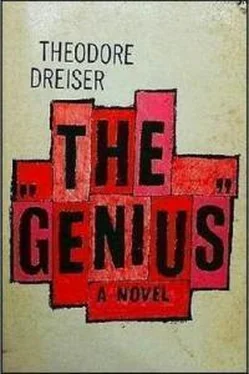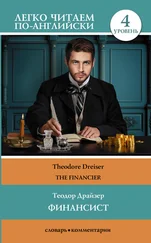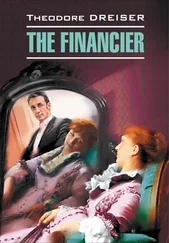Теодор Драйзер - The Genius
Здесь есть возможность читать онлайн «Теодор Драйзер - The Genius» весь текст электронной книги совершенно бесплатно (целиком полную версию без сокращений). В некоторых случаях можно слушать аудио, скачать через торрент в формате fb2 и присутствует краткое содержание. Год выпуска: 2014, Издательство: epubBooks Classics, Жанр: Классическая проза, на английском языке. Описание произведения, (предисловие) а так же отзывы посетителей доступны на портале библиотеки ЛибКат.
- Название:The Genius
- Автор:
- Издательство:epubBooks Classics
- Жанр:
- Год:2014
- ISBN:нет данных
- Рейтинг книги:4 / 5. Голосов: 1
-
Избранное:Добавить в избранное
- Отзывы:
-
Ваша оценка:
- 80
- 1
- 2
- 3
- 4
- 5
The Genius: краткое содержание, описание и аннотация
Предлагаем к чтению аннотацию, описание, краткое содержание или предисловие (зависит от того, что написал сам автор книги «The Genius»). Если вы не нашли необходимую информацию о книге — напишите в комментариях, мы постараемся отыскать её.
The Genius — читать онлайн бесплатно полную книгу (весь текст) целиком
Ниже представлен текст книги, разбитый по страницам. Система сохранения места последней прочитанной страницы, позволяет с удобством читать онлайн бесплатно книгу «The Genius», без необходимости каждый раз заново искать на чём Вы остановились. Поставьте закладку, и сможете в любой момент перейти на страницу, на которой закончили чтение.
Интервал:
Закладка:
During a period of nearly three years all the vagaries and alterations which can possibly afflict a groping and morbid mind were his. He went from what might be described as almost a belief in Christian Science to almost a belief that a devil ruled the world, a Gargantuan Brobdingnagian Mountebank, who plotted tragedy for all ideals and rejoiced in swine and dullards and a grunting, sweating, beefy immorality. By degrees his God, if he could have been said to have had one in his consciousness, sank back into a dual personality or a compound of good and evil—the most ideal and ascetic good, as well as the most fantastic and swinish evil. His God, for a time at least, was a God of storms and horrors as well as of serenities and perfections. He then reached a state not of abnegation, but of philosophic open–mindedness or agnosticism. He came to know that he did not know what to believe. All apparently was permitted, nothing fixed. Perhaps life loved only change, equation, drama, laughter. When in moments of private speculation or social argument he was prone to condemn it loudest, he realized that at worst and at best it was beautiful, artistic, gay, that, however, he might age, groan, complain, withdraw, wither, still, in spite of him, this large thing which he at once loved and detested was sparkling on. He might quarrel, but it did not care; he might fail or die, but it could not. He was negligible—but, oh, the sting and delight of its inner shrines and favorable illusions.
And curiously, for a time, even while he was changing in this way, he went back to see Mrs. Johns, principally because he liked her. She seemed to be a motherly soul to him, contributing some of the old atmosphere he had enjoyed in his own home in Alexandria. This woman, from working constantly in the esoteric depths, which Mrs. Eddy's book suggests, demonstrating for herself, as she thought, through her belief in or understanding of, the oneness of the universe (its non–malicious, affectionate control, the non–existence of fear, pain, disease, and death itself), had become so grounded in her faith that evil positively did not exist save in the belief of mortals, that at times she almost convinced Eugene that it was so. He speculated long and deeply along these lines with her. He had come to lean on her in his misery quite as a boy might on his mother.
The universe to her was, as Mrs. Eddy said, spiritual, not material, and no wretched condition, however seemingly powerful, could hold against the truth—could gainsay divine harmony. God was good. All that is, is God. Hence all that is, is good or it is an illusion. It could not be otherwise. She looked at Eugene's case, as she had at many a similar one, being sure, in her earnest way, that she, by realizing his ultimate fundamental spirituality, could bring him out of his illusions, and make him see the real spirituality of things, in which the world of flesh and desire had no part.
"Beloved," she loved to quote to him, "now are we the sons of God, and it doth not yet appear what we shall be, but we know that when he shall appear"—(and she explained that he was this universal spirit of perfection of which we are a part)—"we shall be like him; for we shall see him as He is."
"And every man that has this hope in him purifieth himself even as He is pure."
She once explained to him that this did not mean that the man must purify himself by some hopeless moral struggle, or emaciating abstinance, but rather that the fact that he had this hope of something better in him, would fortify him in spite of himself.
"You laugh at me," she said to him one day, "but I tell you you are a child of God. There is a divine spark in you. It must come out. I know it will. All this other thing will fall away as a bad dream. It has no reality."
She even went so far in a sweet motherly way as to sing hymns to him, and now, strange to relate, her thin voice was no longer irritating to him, and her spirit made her seemingly beautiful in his eyes. He did not try to adjust the curiosities and anomalies of material defects in so far as she was concerned. The fact that her rooms were anything but artistically perfect; that her body was shapeless, or comparatively so, when contrasted with that standard of which he had always been so conscious; the fact that whales were accounted by her in some weird way as spiritual, and bugs and torturesome insects of all kinds as emanations of mortal mind, did not trouble him at all. There was something in this thought of a spiritual universe—of a kindly universe, if you sought to make it so, which pleased him. The five senses certainly could not indicate the totality of things; beyond them must lie depths upon depths of wonder and power. Why might not this act? Why might it not be good? That book that he had once read—"The World Machine"—had indicated this planetary life as being infinitesimally small; that from the point of view of infinity it was not even thinkable—and yet here it appeared to be so large. Why might it not be, as Carlyle had said, a state of mind, and as such, so easily dissolvable. These thoughts grew by degrees, in force, in power.
At the same time he was beginning to go out again a little. A chance meeting with M. Charles, who grasped his hand warmly and wanted to know where he was and what he was doing, revived his old art fever. M. Charles suggested, with an air of extreme interest, that he should get up another exhibition along whatever line he chose.
"You!" he said, with a touch of heartening sympathy, and yet with a glow of fine corrective scorn, for he considered Eugene as an artist only, and a very great one at that. "You,—Eugene Witla—an editor—a publisher! Pah! You—who could have all the art lovers of the world at your feet in a few years if you chose—you who could do more for American art in your life time than anyone I know, wasting your time art directing, art editing—publishing! Pouf! Aren't you really ashamed of yourself? But it isn't too late. Come now—a fine exhibition! What do you say to an exhibition of some kind next January or February, in the full swing of the season? Everybody's interested then. I will give you our largest gallery. How is that? What do you say?" he glowed in a peculiarly Frenchy way,—half commanding, half inspiring or exhorting.
"If I can," said Eugene quietly, with a deprecating wave of the hand, and a faint line of self–scorn about the corners of his mouth. "It may be too late."
"'Too late! Too late!' What nonsense! Do you say that to me? If you can! If you can! Well, I give you up! You with your velvet textures and sure lines. It is too much. It is unbelievable!"
He raised his hands, eyes, and eye–brows in Gallic despair. He shrugged his shoulders, waiting to see a change of expression in Eugene.
"Very good!" said Eugene, when he heard this. "Only I can't promise anything. We will see." And he wrote out his address.
This started him once more. The Frenchman, who had often heard him spoken of and had sold all his earlier pictures, was convinced that there was money in him—if not here then abroad—money and some repute for himself as his sponsor. Some American artists must be encouraged—some must rise. Why not Eugene? Here was one who really deserved it.
So Eugene worked, painting swiftly, feverishly, brilliantly—with a feeling half the time that his old art force had deserted him for ever—everything that came into his mind. Taking a north lighted room near Myrtle he essayed portraits of her and her husband, of her and baby Angela, making arrangements which were classically simple. Then he chose models from the streets,—laborers, washerwomen, drunkards—characters all, destroying canvases frequently, but, on the whole, making steady progress. He had a strange fever for painting life as he saw it, for indicating it with exact portraits of itself, strange, grim presentations of its vagaries, futilities, commonplaces, drolleries, brutalities. The mental, fuzzy–wuzzy maunderings and meanderings of the mob fascinated him. The paradox of a decaying drunkard placed against the vivid persistence of life gripped his fancy. Somehow it suggested himself hanging on, fighting on, accusing nature, and it gave him great courage to do it. This picture eventually sold for eighteen thousand dollars, a record price.
Читать дальшеИнтервал:
Закладка:
Похожие книги на «The Genius»
Представляем Вашему вниманию похожие книги на «The Genius» списком для выбора. Мы отобрали схожую по названию и смыслу литературу в надежде предоставить читателям больше вариантов отыскать новые, интересные, ещё непрочитанные произведения.
Обсуждение, отзывы о книге «The Genius» и просто собственные мнения читателей. Оставьте ваши комментарии, напишите, что Вы думаете о произведении, его смысле или главных героях. Укажите что конкретно понравилось, а что нет, и почему Вы так считаете.









